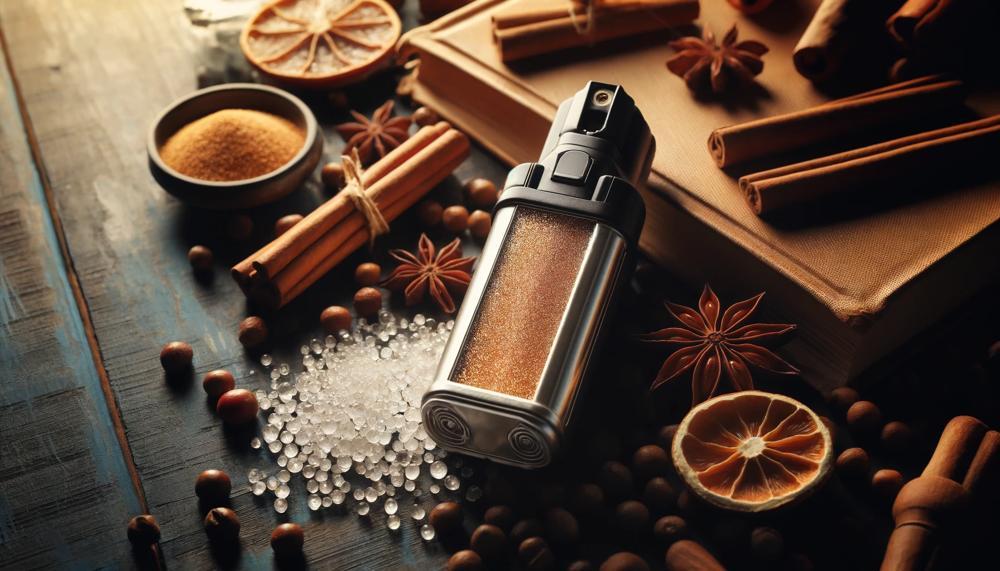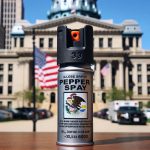Did you know that a mere one-second burst of pepper spray can incapacitate someone for up to 45 minutes? This startling fact underscores the potency of pepper spray, a common self-defense tool. But what happens when this potent substance is ingested, intentionally or accidentally? The consequences can be far more severe than many realize, leading to an urgent exploration of its effects on the human body.
In this blog post, we delve into the rarely discussed aftermath of ingesting pepper spray, providing insights into the physical and potentially long-term health implications.
So, what happens if you eat pepper spray?
If you ingest pepper spray, it can cause significant discomfort and adverse health effects. The concentrated capsaicin in the spray can irritate your mouth, throat, and digestive system, leading to intense burning sensations, coughing, difficulty breathing, and nausea.
More specifically, ingesting pepper spray can lead to severe gastrointestinal distress, including vomiting, nausea, and abdominal pain. Moreover, it can potentially cause damage to the respiratory system, leading to difficulty breathing and choking hazards.
Please note that these effects can be long-lasting and may require medical attention. Therefore, it’s not recommended to ingest pepper spray. If you or someone else has ingested pepper spray, it’s important to seek medical help immediately.
Let’s dive in.
Contents
Understanding Pepper Spray
Pepper spray, derived from chili pepper extract, is a chemical compound that irritates the eyes to cause tears, pain, and temporary blindness. It’s an effective non-lethal self-defense weapon.
How Pepper Spray Works
| Component | Role | Effect |
| Oleoresin Capsicum (OC) | Active ingredient | Causes inflammation, pain, and temporary blindness |
| Delivery Method | Stream, mist, or foam | Dictates range and spread of spray |
| Additional Features | UV dye, safety locks | Helps in marking the attacker, ensures safe carry |
Choosing Pepper Spray
Consider range (6-12 feet) and type (stream, mist, foam). Features like UV dye and safety locks add to its effectiveness.
Usage and Safety
Aim for the attacker’s face and quickly move to safety. Store in cool, dry places. Regularly check expiry dates.
Legal Aspects
Laws vary by state and country. Ensure compliance with local regulations.
Side Effects and Treatment
Pepper spray causes temporary blindness and burning sensations. If accidentally exposed, move to fresh air and rinse with water.
The Components of Pepper Spray
Pepper spray, a crucial ally in personal defense, owes its formidable reputation to a blend of ingredients that pack a punch. Here’s a breakdown of its primary components and the reactions they trigger upon ingestion:
| Ingredient | Role in Pepper Spray | Effects on the Body When Ingested |
| Capsaicin | The fiery soul of pepper spray, extracted from hot peppers. | Induces a burning sensation in the mouth, throat, and stomach, leading to coughing, gagging, and an overwhelming urge to quench the heat. |
| Alcohol | Acts as a solvent, ensuring capsaicin diffuses evenly. | Can cause dizziness, nausea, and exacerbate the irritation caused by capsaicin, making the discomfort more intense. |
| Propylene Glycol | Prevents capsaicin from clumping, ensuring a consistent spray. | Might trigger allergic reactions, presenting as rashes or digestive discomfort in sensitive individuals. |
| Water | Dilutes the mixture, balancing potency. | Generally harmless but can cause distress if inhaled or ingested in the context of pepper spray, contributing to choking. |
Crafted for defense, not for digestion, pepper spray’s concoction can wreak havoc internally, far beyond its intended exterior deterrent effect. The main event, capsaicin, triggers a fiery ordeal, lighting up the body’s alarm systems. Meanwhile, alcohol and propylene glycol add their own brand of chaos, not meant for internal consumption.
Water, the only benign element, stands out as the sole component without a menacing side effect, yet in the mix, it’s a mere bystander to the turmoil.
Is Pepper Spray Safe to Ingest?
No, ingesting pepper spray is unsafe. It’s crafted for defense, not consumption. Capsaicin, its key component, wreaks havoc internally, causing dire gastrointestinal, respiratory, and psychological troubles. Short-term effects like nausea, burning sensations, and pain are just the tip of the iceberg.
Potential Health Impacts
Gastrointestinal Issues
| Symptom | Cause | Severity |
| Nausea | Capsaicin irritation | Mild to Severe |
| Abdominal Pain | Stomach lining inflammation | Moderate to Severe |
| Diarrhea | Gastrointestinal distress | Mild to Severe |
Respiratory Complications
For folks with asthma or similar woes, inhaling or swallowing pepper spray can trigger attacks, hindering breathing. It’s a serious risk, potentially landing someone in the hospital.
Psychological and Skin Reactions
The intense sting of pepper spray can stir panic and anxiety. For those with past traumas, this experience can be particularly harrowing. Skin contact, moreover, can lead to irritation, especially in sensitive areas or on wounded skin.
What Happens If You Eat Pepper Spray
Eating pepper spray is a harmful act that could wreak havoc on your health. This spicy concoction, loaded with capsaicin, isn’t your average hot sauce. It’s a powerful irritant designed to stop threats in their tracks, not to spice up your dinner.
| Effect | Immediate Impact | Long-Term Trouble |
| Gastrointestinal issues | Severe pain, vomiting | Potentially ulcers or digestive tract damage |
| Respiratory problems | Difficulty breathing, coughing | Risk of asthma or chronic bronchitis |
| Skin reactions | Intense irritation, burns | Possible long-lasting dermatitis |
| Eye injuries | Temporary blindness, pain | Risk of corneal abrasions |
What to Do If You Accidentally Ingest Pepper Spray?
In the unfortunate event of accidentally ingesting pepper spray, here’s a step-by-step guide on how to handle the situation:
Immediate Actions
- Rinse Mouth: Start by thoroughly rinsing your mouth with cold water. This helps to mitigate immediate discomfort and remove residual spray.
- Seek Medical Attention: If symptoms are severe or if discomfort persists after rinsing, it’s crucial to seek medical help immediately.
Medical Assistance
| Symptom | Action Required | Note |
|---|---|---|
| Stomach Irritation | Consult a doctor immediately. | Pepper spray can cause significant gastric distress. |
| Breathing Trouble | Seek emergency medical help. | Inhaled spray can affect the respiratory system. |
| Persistent Pain | Get medical attention as symptoms could worsen. | Continuous pain might indicate internal damage. |
Additional Precautions
- Avoid Home Remedies: Home remedies or antidotes are not recommended. Professional medical advice is paramount.
- Avoid Consuming Anything: Until medical advice is given, avoid eating or drinking anything as it could aggravate the condition.
Long-Term Care
After immediate medical attention, follow-up care may be necessary, especially for those with pre-existing respiratory conditions or allergies. Continuous monitoring and adherence to medical advice ensure proper recovery from the accidental ingestion of pepper spray.
It’s also wise to educate yourself and others on the proper handling and storage of pepper spray to prevent future accidents.
Alternative Uses for Pepper Spray
Absolutely, pepper spray, while commonly tucked away for personal protection, harbours a handful of other uses that stretch beyond the realm of warding off would-be attackers. Here’s a look at its alternative applications:
| Use | Description | Notes |
| Wildlife Repellent | Non-lethal deterrent for aggressive animals. | Particularly useful in areas with high wildlife activity. |
| Law Enforcement Training | Used to prepare officers for real-life use. | Helps build understanding and proper handling. |
| Crowd Control | Safe method to manage large groups or riots. | Minimizes harm while controlling situations. |
| Anti-Fungal Agent | Potential applications in combating fungi. | Research ongoing, interesting for agriculture. |

Bear in mind, while these uses show the versatility of pepper spray, it’s paramount to understand the legalities and implications of its use outside self-defense.
Conclusion
Ingesting pepper spray is like bringing a storm into your body, because it is very dangerous. Engineered to disable and protect, this substance contains an explosive mix of chemicals that cause damage inside the body far beyond their original purpose. Ingesting pepper spray causes a chain of bad effects that can happen right away or last for a long time. The main attacker, capsaicin, and its chemical friends attack the digestive system, breathing system, skin, and eyes, causing a chain reaction of pain, discomfort, and health risks.
The wide range of symptoms, from acute pain and puking to trouble breathing and skin itching, paints a bleak picture of what happened next. But the story doesn’t end with instant effects. There may be long-term effects, like damage to the gut system, long-term breathing problems, and ongoing skin problems. This scary story demonstrates how dangerous it is to swallow pepper spray, presenting it as a dangerous mistake rather than a simple slip-up.
Getting through the fallout of such an event requires quick action and medical help. This shows how important it is to treat pepper spray with the respect and care it requires. It is a very useful tool for keeping yourself safe, but it can hurt you if you mistreat it or eat it by mistake.
Let this investigation serve as a stark warning of the lines between safety and danger and urge people to be careful and well-informed when dealing with chemicals like pepper spray.





